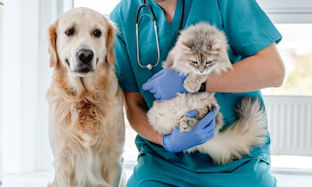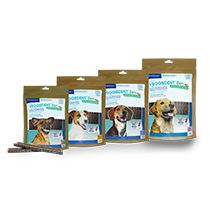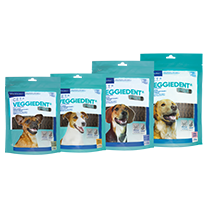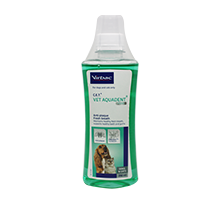
Pet Teeth vs Human Teeth – Understanding Structure, Care, Cost and Dental Treatment
The world of teeth is fascinating and diverse, with each species having its unique dental arrangement. In this blog post, we'll explore the differences between pet teeth and human teeth, including their structure, care requirements, the cost associated with dental procedures, and available dental treatments. So, let's delve into this captivating topic!
Dental Differences Across Species:
Cats and dogs have distinct dental structures. Cats start with 26 deciduous teeth and develop 30 permanent teeth, while dogs begin with 28 baby teeth and grow an impressive 42 permanent teeth. Humans, on the other hand, have 20 baby teeth that are eventually replaced by 32 permanent teeth. These differences in tooth numbers reflect the diverse dietary needs and lifestyles of each species.
The Complexity of Pet Teeth Extraction:
Have you ever wondered why extracting a dog's tooth can be more challenging than extracting a human tooth? Pet teeth extraction involves more than just "pulling teeth." Dogs and cats have intricate dental anatomy, often featuring long, curved roots that are deeply embedded in the jawbone. Premolars and molars may even have multiple roots per tooth. Due to this complexity, dental extractions for pets often require sectioning or cutting the teeth into pieces to minimize the risk of root breakage. This ensures the removal of the entire tooth, preventing future pain and dental abscesses.
Cost Considerations for Pet Dental Procedures:
The cost associated with pet dental procedures can sometimes surprise pet owners. However, several factors contribute to the expenses involved. Apart from the dental cleaning process, which includes ultrasonic scaling and polishing, pets require anaesthesia during the procedure to ensure their safety and comfort. Pre-anaesthetic exams and blood screenings are typically conducted to mitigate risks. Dental radiographs are taken to assess the health of the roots, determine the need for extractions, and evaluate the condition of the gum line. In cases requiring root removal, dental flap surgery might be performed. Additionally, monitoring and post-procedure care are essential for your pet's well-being. The cost of a pet dental procedure reflects the expertise, equipment, anaesthesia, preventative measures, potential treatments, and aftercare provided by your veterinarian.
Are Pet Dental Check Ups Necessary?
Veterinarians strongly advise scheduling annual physical examinations for your four-legged companions? Here's why:
-
Dental disease in cats and dogs is very common
-
Regular dental care helps prevent oral problems such as gum disease, tooth decay, and bad breath
-
Dental cleaning helps prevent the development of the periodontal disease
-
The pain resulting from advanced dental disease may cause difficulties in eating, resulting in weight loss
-
Bacteria and the toxins produced by the bacteria on the teeth can also get into the blood stream and cause damage throughout the body in organs such as the kidneys, heart and liver.
Maintaining dental health in pets is crucial, and dental care is often overlooked by many pet owners. Dental chews approved by the Veterinary Oral Health Council (VOHC) offer a solution. These dental chews not only make your pet happy but also aid in preventing plaque and tartar build-up. Chewing stimulates saliva production, which helps neutralize acids and remove debris from the teeth. Active chewing can significantly reduce plaque, and certain dental treats and diets have been shown to decrease plaque by up to 70%. Introducing VOHC-approved dental chews to your pet can improve their oral health while providing an enjoyable snack.
So, what is VOHC approved?
These are products that have received approval from the Veterinary Oral Health Council (VOHC). This ensures that they meet the necessary standards for promoting oral health in pets. The Veterinary Oral Health Council evaluates dental products for effectiveness and their seal of acceptance will only be found on products which have been shown to reduce the accumulation of plaque and/or tartar.
But here's a word of caution: Avoid using products that haven't been approved by the VOHC or those that are excessively hard and difficult to bend or break. Bones, and synthetic bones may seem tempting, but they can pose a risk to your pet's dental health. These hard objects can easily lead to tooth fractures and other dental problems.
Introducing Veggiedent Dental Chews:
Our Veggiedent range of dental chews is specifically designed to promote oral health, joint support, and relaxation in pets. These VOHC-approved dental chews offer a longer chewing time, ensuring sustained mechanical action for effective plaque and tartar prevention. With easy-to-use dental home care products formulated by veterinary dentists, you can keep your dog's teeth and gums healthy, prevent painful dental diseases, and provide joint and mental well-being support. Your furry friend deserves the best dental care possible, and Veggiedent offers a holistic approach to enhance their overall wellness.
Understanding the differences between pet teeth and human teeth helps us appreciate the remarkable diversity found in the animal kingdom. Dental extractions for pets are complex procedures that require specialized expertise due to their unique dental anatomy. The cost of pet dental procedures reflects the comprehensive care provided by veterinarians to ensure the health and safety of your furry companions. Additionally, VOHC-approved dental chews offer a convenient and effective way to support your pet's oral health. Consider incorporating Veggiedent dental chews into your pet's routine to maintain their dental well-being while providing them with a tasty treat they'll love.
Start prioritizing dental care for your pets today and give them the dental care they deserve.
Follow us on social media


.png)


